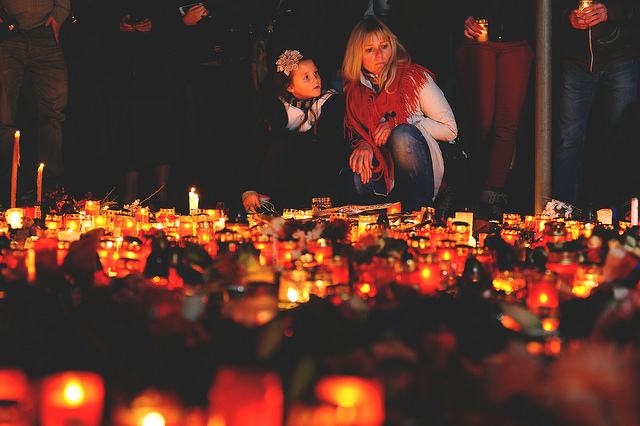A piece on the Paris attacks by Sebastian Hicks
The air breathes differently when we are afraid. Friendships and connections can be truly forged in difficult times, tightly bound by the plight of circumstance. This weekend we had an unfortunate opportunity to reconnect and reach out to those who have been present at different stages of our lives: some for years, other just for a few moments. At Saint Michel on Friday, I realised how much people mean to me, and surprisingly, how much I mean to them. I answered phone calls from people I had not heard from in years and messages from people I barely knew. When people are brought together they can always find common ground and time is better spent on communication, no matter how difficult, than on supposition, no matter how easy.
At Sciences Po, we have all had the pleasure of enjoying the freedom to explore. We benefit from the freedom to inform ourselves, to challenge ideas and to remain passionately curious. To avoid extreme conclusions is to realise the complex and conditioned state of affairs we live in today. The terrible tragedy of Friday’s terrorist attacks across Paris shed light on how difficult a challenge this can be, and how sometimes a radical solution can be presented as the path of least resistance. To chase certainty and accuracy is a noble goal, but to be certain and to disregard evidence to the contrary is to live in the dark.
When such a tragedy happens, it is important that scholars at all levels from undergraduates to professors uphold their obligation to think and promote everyone’s right to query and question. We have an opportunity to instil a certain standard of humanity within ourselves and amongst our peers. In such a time we cannot submit ourselves to stereotypes or pejorative terms used out of anger. Informed discussions do not shout and scream, they do not use a gun or a spear, intelligence whispers quietly and sometimes it is hard to hear.
With so many dead and injured, the scale of the attack has brought a greyness and listlessness to an incredible city. Those killed should be remembered as innocent brothers, sisters, mothers and fathers. Their light shall not be dimmed by the decisions of a small group of men intent on implementing a policy of arbitrary retribution. Sciences Po has displayed incredible yet unsurprising unity. It is wrapped in a cosmopolitanism that respects all nations and all backgrounds, where students can blend their ideas together and be restless, avid thinkers. To avoid isolation, censorship and fear, students must be ready to hear and accept ideas they do not like. There is no such thing as a stereotype only presumptions on your part. Students have come together over the last 48 hours in a way that proves the necessity of diversity and tolerance.
We have not nurtured individuality and personal freedoms only to package and price them under the same barcode, we all have a duty to inform ourselves, and if we are going to speak and to act, let it be of our own accord always with humanity in heart and in mind. Perhaps the shoulder to lean on in such times is Voltaire, who delicately reminds us we should always leave room for others to express themselves, but he also said something else: “Let us read, and let us dance; these two amusements will never do any harm to the world.” To engage with the words and music that the world has to offer, to not select your favourite chapters and burn the rest, is to be a citizen of the planet, and perhaps in that regard: nous sommes le monde, nous sommes Paris.

